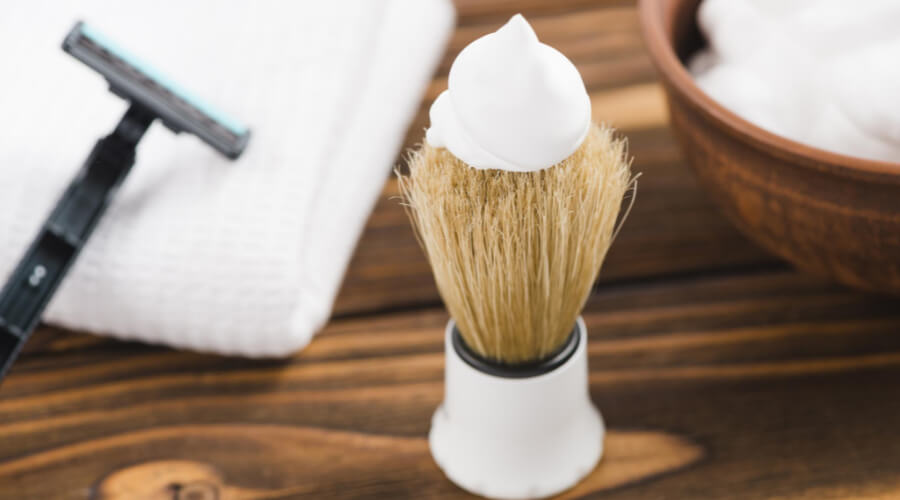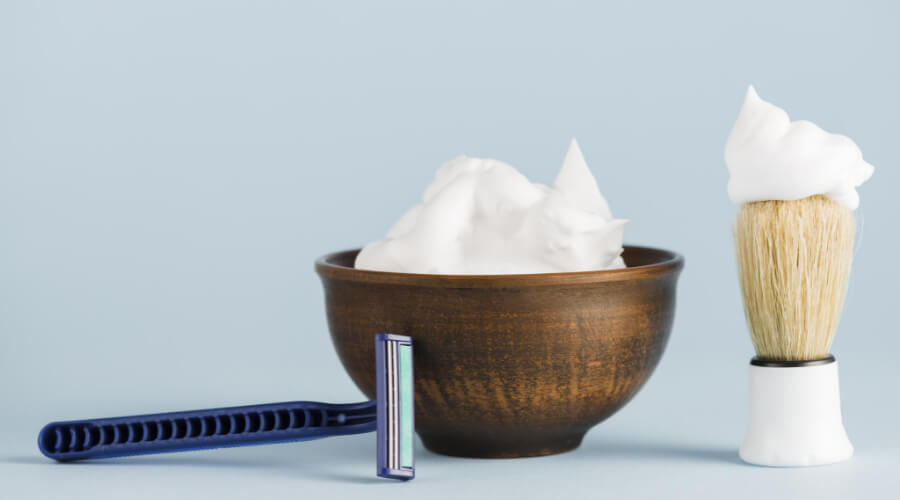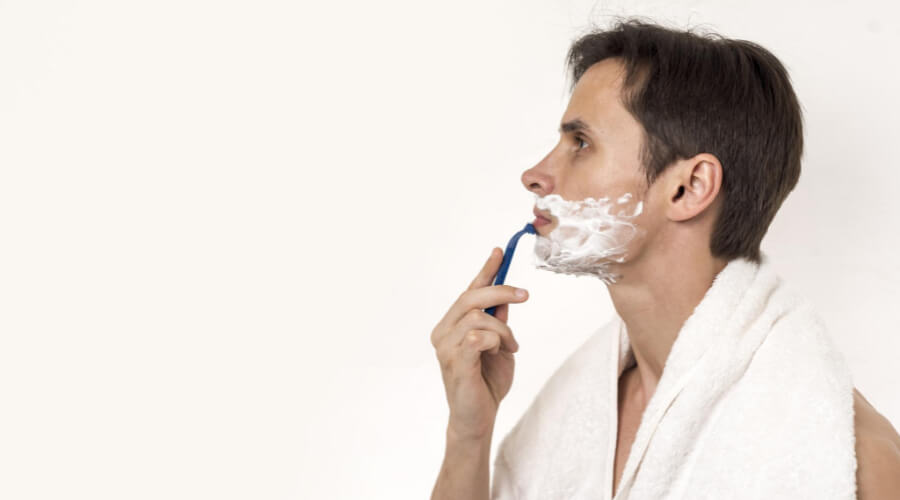Shaving cream lubricates the skin and hair, reducing friction during shaving. It also softens hair, making it easier to cut, and moisturizes the skin, helping to prevent irritation and razor burn.
Do You Need To Use Shaving Cream?

No, but shaving cream makes the experience better.
Let’s see why you may need it and how to shave without it.
Why You Need The Cream
It is possible to shave creamless and do it safely and carefully. But, remember that dragging a sharp surface over soft, sensitive skin can quickly turn into a disaster.
1. Shaving cream highly reduces your risk of injury during grooming. Minus the product, cutting hair with no lube is like working through a risky job; you could hurt yourself.
2. Also, the cream prevents you from picking up itchy bumps, redness, and razor burns. Those conditions happen when you scrape off skin cells with dry shaving, so use a lubricant when you can.
3. Finally, shaving cream saves you from developing pus-filled bumps, which can spoil your overall look.
What if your shaving cream is out of reach or is expensive? Well, here are some tips on how to work without it:
Shaving Without Cream
Follow these steps, and your dry shaving will be excellent:
1. Always use a new or clean blade whenever you are shaving. If the blade is coming right out of its package, it’s already been sterilized and protected. That way, it will not spread bacteria even if you nip your skin.
2. Put only a little pressure when running the razor, especially if you want a slightly closer shave. That way, the blade will not have a lot of contact with the skin, rendering you safe from possible cuts.
3. Before you shave, use warm water or take a steam bath. That way, you will open up your hair follicles.
If you can, shower under running warm water. That way, the continuous stream will help in lubricating the shaven areas.
Once you finish the dry shaving:
1. Use a lotion of your choice to create a barrier for skin moistening.
2. If you cut or nick yourself, apply antibacterial ointments like neomycin and bacitracin. Those help to stop any infection from ravaging and destroying your skin cells.
Pros and Cons of Using Shaving Cream
Shaving cream paves the way for a smoother, more comfortable shave. However, like every product, it also carries its own set of advantages and disadvantages. In this piece, one will delve into the pros and cons of using shaving cream.
Pros of Using Shaving Cream
- Improved Glide: Shaving cream fosters a smoother surface for the razor to glide upon, which decreases friction, reduces the risk of cuts, and minimizes skin irritation.
- Moisturization: Many shaving creams contain moisturizing ingredients like glycerin that hydrate the skin as one shave. These constituents can leave the skin feeling soft and supple rather than dry and tight.
- Lifts Hair: The lather from shaving cream lifts the hair, making it easier for the razor to cut through. This results in a closer, cleaner shave.
- Vibrant Skin: Shaving cream is typically packed with nourishing ingredients that brighten and refresh the skin, providing a youthful and vibrant appearance.
- Visible Trimming Line: The application of shaving cream gives one a visible line to track their shaving progress, reducing the risk of missing spots or over-shaving an area.
Cons of Using Shaving Cream
- Skin Reactions: Some users may experience allergic reactions or skin irritations due to certain chemicals or fragrances present in some shaving creams.
- Cost: Compared to alternatives like soap or body wash, shaving creams can be more expensive in the long run.
- Messy: Using shaving cream can be quite messy, with the lather often sticking to the sink or bathroom surfaces.
- Not Environment-Friendly: Most, but not all, shaving creams come in aerosol cans, which are not good for the environment. Also, the production process of shaving creams can be quite harmful to the environment.
- Not Suitable for All Shaving Tools: Shaving cream is not always suitable for use with all shaving tools. Electric razors, for example, can be damaged by the use of shaving cream.
What are shaving creams made of?
Shaving creams are indispensable for a smooth and comfortable shave. They soften the hair and provide lubrication that aids in reducing the risk of razor burns or nicks. So, what exactly are these seemingly simple products made of? This listicle breaks down some common ingredients found in shaving creams.
1. Water
The primary ingredient in most shaving creams is water. It acts as a solvent and is used to dissolve and combine all other ingredients.
2. Stearic Acid
Stearic acid, a fatty acid found in vegetable and animal fats, is an essential ingredient. It is responsible for the creamy and thick texture of the shaving cream which helps in creating a rich lather.
3. Glycerin
Glycerin, a by-product of soap making, acts as a humectant. It helps to keep the skin hydrated and provides lubrication that allows the blade to glide smoothly over the skin.
4. Potassium Hydroxide and Sodium Hydroxide
These two alkaline ingredients play a crucial role in producing the lather. By reacting with stearic acid, they help create a soap base in the shaving cream.
5. Coconut Acid
Derived from coconut oil, coconut acid is used as a secondary lathering agent. This component provides a cleaner and more comfortable shave.
6. Fragrance
Fragrances or essential oils are typically added to give the shaving cream its distinctive smell. Most common scents include sandalwood, lavender, or menthol.
7. Aloe Vera
Aloe Vera is one of the soothing agents used in shaving creams. It helps to soften the hair follicles, making it easier for the razor to cut through. Additionally, it reduces skin irritation post-shave.
8. Allantoin
Allantoin is an effective moisturizing ingredient and its desirable healing, soothing, and anti-irritating properties make it a preferred component in shaving cream.
9. Preservatives
Preservatives, such as parabens, are often added to prevent the product from spoiling or growing bacteria. However, some may prefer creams that do not contain parabens due to potential health concerns.
Do You Need Shaving Cream To Shave Your Pubes?

No.
But, it will be better if you partner with a creamy product.
1. If you decide to go shopping, pick a cream that does not have any fragrance. If you do, you may irritate your skin. Talk about all the scratching that comes after that!
2. After shaving, do not apply any baby or talc-based powder.
MenNStuff 101: Unlike other areas, the pubic region has sensitive skin. Have that in mind as you go down there.
What Are Some Alternatives To Shaving Cream?
So, are you out of cream, and you still want to buzz yourself away? Here are some options you can look at:
1. Body lotion (cream-based)
2. Cream rinse or hair conditioner
3. Gel (Aloe Vera etc.)
4. Water
Can I Shave With Just Water?
Yes.
Water is the best, least-expensive shaving partner. When it runs over your skin, it opens up the pores and relaxes the follicles.
If you are shaving with water, ensure you start it off warm. Once you complete, lock in the moisture by running cold water. After toweling, apply some lotion to finish off the job.
Can I Shave With Lotion?
Yes.
Cream-based lotions are the best because they mimic shaving creams. These skincare products create the much-needed layer of protection between the blade and razor. That way, you save your skin from dry-shave stress.
MenNStuff 101: If your lotion is too oily, you may get your razor all sticky and greased up. That reduces the blade’s lifetime, so be careful with this lotion option.
Do You Shave Up Or Down?

Down
To protect your skin from ingrown hairs and razor burns, always shave going downwards.
MenNStuff 101: Shaving downwards is also known as shaving with the grain. On the other hand, shaving upwards is shaving against the grain.
Let’s look at each type briefly.
Shaving Upwards
Pros
1. You get a closer shave.
2. Shaving is faster.
Cons
1. Damage to hair follicles
2. More razor burns and ingrown hair
Shaving Downwards
Pros
1. Best for sensitive skin
2. Little to no ingrown hair and razor burns
3. Effortless
4. Pain-free
Cons
1. You won’t get a close shave
Depending on your shaving needs, you know which option to go for.
Why Is Shaving Cream Bad?
With all that said, it is time to look at the flipside of shaving cream. Here are the top reasons why you should toss away that product:
1. Some of the creams contain harmful chemicals.
2. Others have ingredients that affect your skin’s hydration.
3. Some contain mineral oils, which increase skin irritation by clogging the pores.
MenNStuff 101: For more on that subject, here is a well-done post about the cons of shaving cream.
Conclusion
Shaving cream does much more than wetting your skin. If you are on a budget, though, water can help you through your shave. Others like lotion are good candidates, but they will reduce your razor’s efficiency. Using lotion over time will make you replace your blade sooner than you expect.
References:
https://www.vitaman.com.au/blogs/v-male/what-does-shaving-cream-do-and-why-you-need-to-use-it
https://uk.cremocompany.com/blogs/blog/what-does-shaving-cream-do

